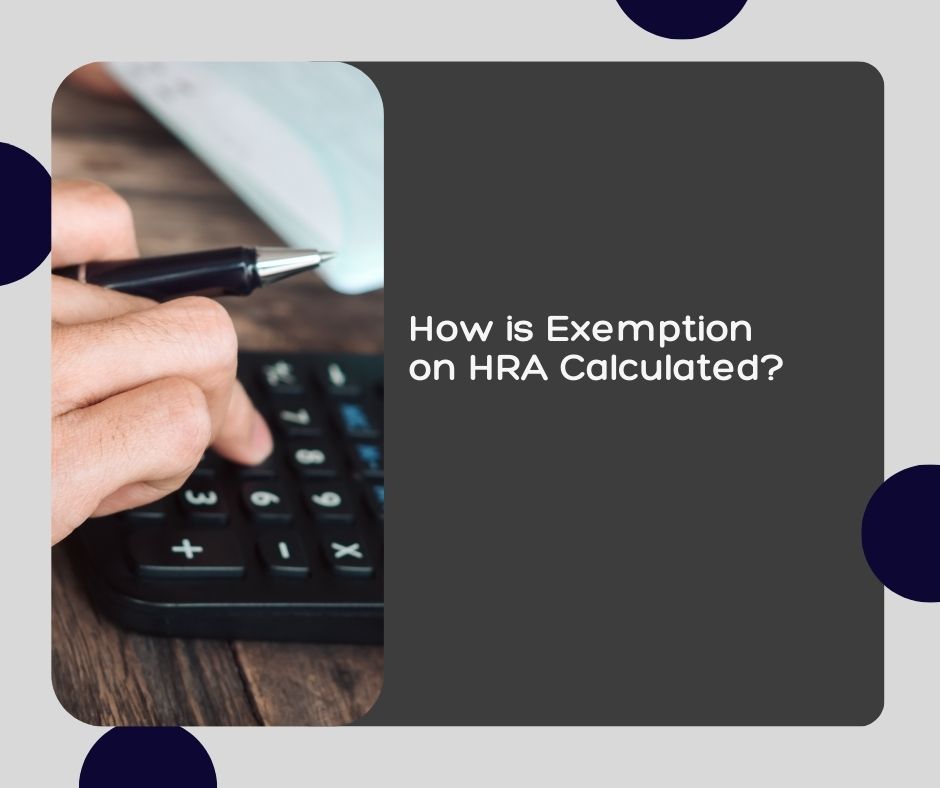How is Exemption on HRA Calculated?

Gone are the days when salary only meant your daily or hourly pay. Today, your salary consists of everything, all kinds of compensation and allowances. It caters to every purpose, including contributing to a provident fund and more. This article is going to explain the HRA segment of your salary and how exemption on HRA is calculated. Keep reading to understand it in depth.
What is HRA?
HRA, which is the acronym for ‘House Rent Allowance.’ HRA is a taxable element of your salary slip, and it represents the sum that the employer gives to the employees to cover the living expenses (rent). It assists in reducing the overall tax liability.
Before we start understanding HRA tax exemption, let’s understand HRA a little more.
As previously mentioned, HRA is an element of your pay slip. It is a segment that is taxed by the government. It is an allowance issued by your employer to cater to your rent expenses.
Now, the HRA for every employee would not be the same. It will vary based on the city they reside in. It will also differ based on the city’s cost of living.
For instance, if you are working in a remote city of the country, and your friend is working in a metropolitan city of the country where the cost of living is higher, his HRA will be higher than yours.
What is Exemption on HRA?
Based on Section 10, the amount you receive as part of HRA may be subtracted from your taxable salary, and that is HRA Exemption.
So, according to the Income Tax Act of 1961, a part of your HRA can be exempt from taxes, and the balance left of your salary will be taxed. Doesn’t this sound like a good way to reduce income and save more money?
To make sure of the amount of HRA that would be deducted from your total salary, eligible criteria need to be met. Also, you can’t possibly use HRA if you live in your own house since it covers house rent.
How is Exemption on HRA Calculated?
House Rent Allowance is based on your salary, but according to Indian taxation rules, tax exemption is a segment of the HRA. The factors mentioned below determine how HRA is typically calculated:
Rent: The rent that you are actually paying to live in the city and a particular location is a point to consider. You cannot claim HRA if you are lodging or even own the place, as mentioned before. You would need rent receipts, bank statements, and a lease agreement to prove you are paying the rent.
Residence: The city that you reside in takes a large part in deciding your HRA. If you live in a metropolitan city, as stated above, the cost of living is higher, and your HRA can be 50% or lower. In the case of living in a non-metropolitan city, your HRA will be 40% or lower.
Salary: The varied salary components like – basic salary, DA (dearness allowance), or any other special allowance will play a role in determining your HRA.
HRA from the Employer: The actual amount of HRA you get from your employer is a crucial factor in calculating your deductions.
Let us understand it with an example.
Now, this is just an example to show you how HRA exemption will work and how to calculate it. Consider the below-mentioned points.
- You earn a basic salary of Rs. 15,000
- Your employer gives you an HRA of Rs. 7,500 (provided you reside in a metropolitan city.)
- From your salary, you hold other conveyances and allowances, and they are:
Conveyance Allowance: Rs. 1,500
Leave Travel Allowance: Rs. 700
Special Allowance: Rs. 200
Your total salary will be: Rs. 24,900
The total rent you pay in a year: Rs. 1,20,000
HRA Exemption: Rs. 7,500
HRA Chargeable to Taxation: Rs. 0
Who Can Claim HRA Tax Deductions?
If you meet the below-mentioned criteria, you can claim tax deductions under Section 10(13A) of the Income Tax Act:
- HRA is a segment of your pay slip.
- Your name is on your renter’s receipt.
- You need to be salaried or a paid employee.
- You need to reside in a rented house.
What Documents Do You Need to Claim HRA Tax Exemption?
- You will need the receipts for paying your rent in order to calculate HRA deductions or even a specific rental agreement that specifies the corresponding rent amount.
- You will also need a copy of your landlord’s PAN card or a declaration form with their signature if the rent is more than Rs. 1,00,000 per year. The same documentation will be needed for the family members’ rent payments to calculate the HRA tax.
What Happens if You Don’t Receive HRA?
There are chances you might be someone who does not receive HRA, but you know what? You can still utilize the provisions of Section 80GG to claim HRA exemption. If you are self-employed or have your own services, it is possible you do not get HRA like an employee, but that’s where Section 80GG can help you out.
So, when you compute HRA exemption, ensure that you are eligible to claim deductions under Section 80GG or Section 10(13A).
So, don’t worry; even if you are not a salaried employee, there are other renter’s benefits that you can look forward to.
Conclusion
Just remember, if you are paying rent to a spouse or any other family member, you can’t claim this benefit. But, even if you have taken a home loan, you can claim HRA. You can also claim HRA when you are living together with your family, such as your parents. There are several other things you would have to think about when you want to claim this deduction. Once you have had an overview of this post, you will have to find out if you can avail yourself of HRA tax benefits and how it works.
The key point is that tax exemption has been made more accessible by the government; use it while you can!

Pranab Bhandari is an Editor of the Financial Blog “Financebuzz”. Apart from writing informative financial articles for his blog, he is a regular contributor to many national and international publications namely Tweak Your Biz, Growth Rocks ETC.






